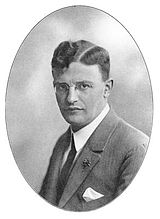This article has multiple issues. Please help improve it or discuss these issues on the talk page. (Learn how and when to remove these messages)
|
Herman Dooyeweerd | |
|---|---|
 Dooyeweerd, c. 1930 | |
| Born | 7 November 1894 |
| Died | 12 February 1977 (aged 82) |
| Era | 20th-century philosophy |
| Region | Western philosophy |
| School | Reformational philosophy, Continental philosophy, Neo-Calvinism |
Notable ideas | Modal aspects,Meaning-oriented philosophy,Religious ground motive |
| Part of a series on |
| Christian democracy |
|---|
 |
|
|
Herman Dooyeweerd, also spelled Herman Dooijeweerd (7 October 1894, Amsterdam – 12 February 1977, Amsterdam), was a professor of law and jurisprudence at the Vrije Universiteit, Amsterdam from 1926 to 1965. He was also a philosopher and principal founder of Reformational philosophy[3] with Dirk Vollenhoven,[4] a significant development within the Neo-Calvinist (or Kuyperian) school of thought. Dooyeweerd made several contributions to philosophy and other academic disciplines concerning the nature of diversity and coherence in everyday experience, the transcendental conditions for theoretical thought, the relationship between religion, philosophy, and scientific theory, and an understanding of meaning, being, time and self.
Dooyeweerd is most famous for his suite of fifteen aspects (or 'modalities', 'modal aspects', or 'modal law-spheres'), which are distinct ways in which reality exists, has meaning, is experienced, and occurs. This suite of aspects is finding application in practical analysis, research and teaching in such diverse fields as built environment, sustainability, agriculture, business, information systems and development. Danie Strauss, the editor of Dooyeweerd's Collected Works, has provided a systematic look at Dooyeweerd's philosophy here.
- ^ Van Raak, Ronald. "Afscheid van filosoof Balkenende". Parlement.com. Retrieved 15 July 2023.
- ^ De Jong, Piet H. "Dooyeweerdianen overheersen in kabinet". Nederlands Dagblad. Retrieved 15 July 2023.
- ^ Several names for Dooyeweerd's system have appeared over the last few decades. His original De Wijsbegeerte der Wetsidee (3 vols., Amsterdam: H.J. Paris, 1935-6) translates as "The Philosophy of the Law-Idea". However, Dooyeweerd wrote in his later New Critique of Theoretical Thought that the "best English term corresponding to it seems to be ‘cosmonomic Idea’, since the word ‘law’ used without further specification would evoke a special juridical sense which, of course, cannot be meant here" (NC I, 93). While this phrase has been popular among Dooyeweerd scholars, some have also used the phrase "law framework philosophy", such as Roy Clouser (cf. Clouser 2005, 2010) and Adolfo Garcia de la Sienra Guajardo (cf. Garcia de la Sienra 2010).
- ^ While many Dooyeweerd scholars believe Dooyeweerd's thought to be compatible with that of Vollenhoven, others have cast doubt on such a view. For the former view, see Wolters (1985). For the latter, see Friesen (2005).